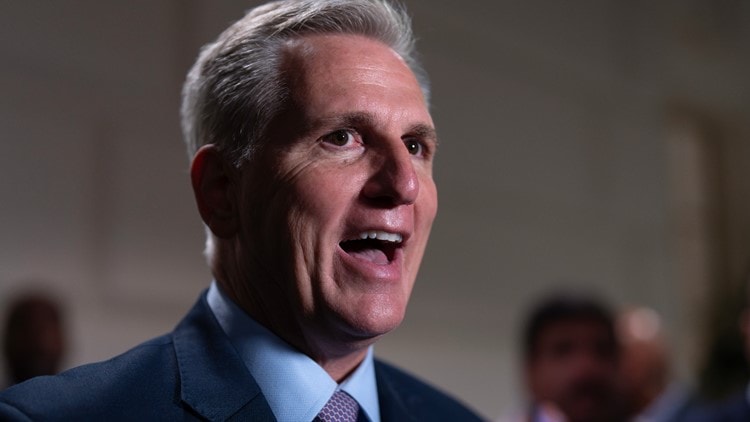Article, FEATURED STORIES, Politics, U.S.
Unprecedented Ouster: The Fall of McCarthy and the Race for Speakership

Former House Speaker Kevin McCarthy
Recap of events
In an unprecedented turn of events, Kevin McCarthy was ousted from the position of House Speaker in a historic vote Tuesday evening, marking the first time in U.S. history this has occurred. This shocking development on Capitol Hill unfolded rapidly, leading to a scramble among Republicans to fill the now-vacant seat, with the House set to adjourn until Friday morning.
McCarthy’s 269-day reign as speaker was ended by a 216-210 vote, with eight Republicans, led by Rep. Matt Gaetz (R-Fla.), voting with Democrats.
Discontent had been brewing among hardline Republicans regarding the US aid directed towards war-torn Ukraine, arguing that these funds could be better utilized for domestic concerns like border security, law and order, and climate-related disaster relief.
In an attempt to bridge divisions, McCarthy dropped provisions concerning aid to Ukraine while negotiating a bipartisan deal on a stopgap spending bill last week. This move aimed at averting a government shutdown that would halt all but critical government services. However, his critics accused him of striking a secret deal with Democrats for a separate vote on the funding later. Fuelled by this accusation, they initiated the move to topple him, culminating in the historic vote that ousted him from the Speaker’s position.
Shortly after his ouster, McCarthy announced he wouldn’t try to reclaim the position.
“I will not run for Speaker again. I’ll have the [Republican] conference pick somebody else.”
He blamed Rep. Matt Gaetz for orchestrating the motion, irrespective of the circumstances, and emphasized the importance of keeping the government open and ensuring the military and border agents are paid.
Transition and Interim Leadership
This left the Republicans without a clear successor, halting the House’s core legislative functions at a crucial juncture. In the wake of McCarthy’s fall, a handful of Republicans have emerged as potential successors, notably House Majority Leader Steve Scalise (R-La.), Judiciary Chair Jim Jordan (R-Ohio), and Republican Study Committee Chairman Kevin Hern (R-Okla.). Scalise and Jordan announced their candidacies on Wednesday afternoon, while Hern indicated interest.
As the dust settled, Rep. Patrick McHenry (R-N.C.) stepped in as the interim House Speaker, a role he will serve until a permanent replacement is chosen. McHenry, a key McCarthy ally, brings a wealth of experience from his tenure as the chair of the House Financial Services Committee. His appointment followed a secret process, as required by House rules, revealing his name only after McCarthy’s removal. His stance against increased banking oversight measures following Silicon Valley Bank’s collapse earlier this year had garnered national attention.
In a surprising follow-up, McHenry ordered Nancy Pelosi and her long-time deputy, Steny Hoyer to vacate their workspaces in the US Capitol, with the rekeying of their office locks set for Wednesday. The eviction is a stark deviation from tradition, leading to a transfer of Pelosi’s office to McCarthy, as announced by Republican Congressman Garret Graves. Pelosi, not currently in Washington, criticized the decision as “a sharp departure from tradition.” In a statement, she said, “With all of the important decisions that the new Republican Leadership must address, which we are all eagerly awaiting, one of the first actions taken by the new Speaker Pro Tempore was to order me to immediately vacate my office in the Capitol.”
Reactions and Historical Context to McCarthy
The reactions to McCarthy’s ouster have been a mix of shock, endorsement, and criticism, reflecting the polarized atmosphere on Capitol Hill. Among the reactions, the suggestion of former President Donald Trump as a potential candidate for Speaker made headlines, adding more intrigue to the unfolding drama. This notion was propelled by Texas Rep. Troy Nehls, who expressed his intent to nominate Trump upon the House’s reconvening, citing Trump’s proven record of prioritizing America.
Conservative voices have expressed diverse opinions on the ouster. Some appreciate the accountability aspect, emphasizing that Republican leaders often renege on promises to curb spending. Others, however, view the ouster as detrimental, especially considering there isn’t a clear successor to McCarthy. They argue that this reflects badly on the party, showing a lack of unity and governance capability, which could adversely affect the Republicans in upcoming elections.
Senate Minority Leader Mitch McConnell, R-Ky., praised McCarthy and said optimism that would “remain a valuable guide” for the House.
“The Speaker’s appetite for worthy causes steered a narrow majority to seize historic opportunities for the American people and for conservative principles,” McConnell said. “His willingness to face the biggest challenges head-on helped preserve the full faith and credit of the United States and showed colleagues how to handle every outcome with grace.”
The ouster also sparked a discourse on the motion to vacate, a procedure allowing any member to introduce a motion to remove the Speaker. This was a change from the rules under McCarthy’s Democratic predecessor, Nancy Pelosi, where a majority from one party was required to bring such a motion to the floor.
Though first used in 1910, the motion gained prominence in instances involving Speaker Newt Gingrich in 1997 and Speaker John Boehner in 2015, both facing party dissent similar to McCarthy. However, McCarthy’s case is the first successful application, marking a historic moment in U.S. politics.
With the internal elections scheduled for October 11, the GOP is at a crossroads. The upcoming days are crucial as Republicans navigate through uncharted territory, seeking to elect a Speaker who can unite the caucus and lead them forward in these turbulent times.

